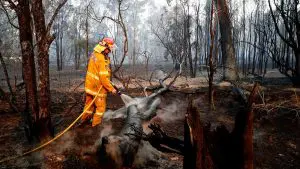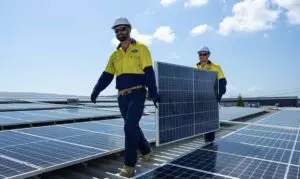Wind, solar and big batteries will become the dominant providers of stable and secure electricity supplies, ably taking over the traditional role of emissions-intensive fossil fuel generators, new expert analysis has shown.
The study was commissioned by think tank The Australia Institute and undertaken by energy economist Professor Bruce Mountain and battery expert Dr Steven Percy from the Victorian Energy Policy Centre.
The study found that not only are clean energy technologies capable of providing reliable supplies of power, but that also battery technologies are set to become the dominant provider of system strength services within the energy market, displacing fossil fuelled generators from their traditional roles.
According to the analysis, batteries and demand response services were already providing more than one-third of Australia’s key frequency control services in the last quarter of 2020 while making up just 0.5 per cent of capacity within the electricity market.
“The business model underpinning coal and gas is collapsing before our eyes and the good news is that batteries and renewable energy are now able to step in and keep the grid secure,” report author Mountain said.
“Renewables already create the cheapest electricity in the market and the last leg the fossil fuel industry had to stand on was the security services they have historically provided. Now we can see that even those services are being delivered in a more reliable and affordable way by renewable energy and that trend will only accelerate in the future.”
System strength services, such as frequency control measures, have traditionally been provided by larger fossil fuelled generators, making small and rapid adjustments to their output to maintain a balance in supply and demand, accounting for the ongoing fluctuations in energy use.
Demand for frequency control services has grown in recent years, as the supply of variable wind and solar power has grown, but the emergence of battery storage as an effective provider of grid stability services provides a ready-made solution.
Big batteries have demonstrated their ability to provide cost effective and very high quality grid stability services at a significantly lower cost than coal and gas generators as the nature of battery technologies allows for these rapid adjustments in output to be made effectively instantaneously – as they do not require big physical machinery to ramp up and down.
The operation of the Hornsdale Power Reserve, which saw 100MW of Tesla big batteries deployed in South Australia, proved a revelation for the grid, slashing the cost of frequency control services by tens of millions of dollars. The Hornsdale big battery has now been expanded to 150MW in size to play an expanded role in the South Australian energy market.
The Australia Institute’s energy policy lead, Dan Cass, said that research suggests that the diminishing revenues received by coal generators is likely to result in their accelerated exit from the energy market.
The think tank hopes to use the analysis as part of a pitch to energy market regulators, including the Energy Security Board, which is currently undertaking a review of post-2025 energy market design reforms to lift regulatory barriers to the increased use of renewables and batteries to provide energy services.
“As coal generators continue to lose money, they will make financial decisions that harm system security by reducing maintenance or mothballing units. We must prepare for this inevitability,” Cass said.
The analysis found that big batteries are able to provide a higher volume of system security services compared to coal fired generators of the same size. The research cite the example of a 350MW big battery announced by EnergyAustralia that will be built at the site of the 1,480MW Yallourn brown coal power station in Victoria.
While delivering less than a quarter of the total dispatchable capacity of the Yallourn power station, the new big battery could deliver as much as three times the amount of inertia services, significantly boosting the strength of the energy system in Victoria.
“Coal power stations are closing and being replaced by clean energy, but there is no national plan for replacing the security services that are provided by coal. Batteries, renewables and demand response are being held back by barriers that prevent them from contributing to system security, despite their exceptional potential in this space,” Cass added.
“Thankfully, this research shows that renewable energy is capable of providing sufficient system security to support the grid and that Australians are ready for that transition to take place. Half of Australians want batteries to be used in keeping the grid secure while just one in four want coal to continue performing that function.”







